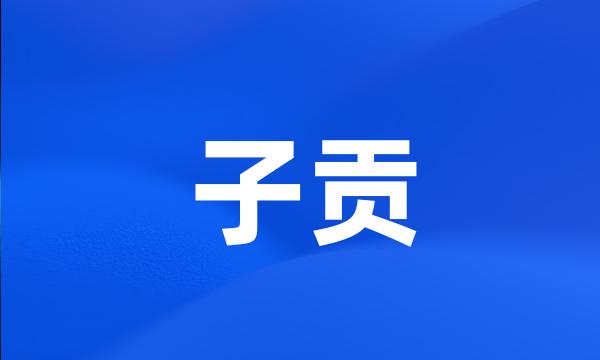子贡
- 网络Zigong;Tzu Kung
 子贡
子贡-
[Zigong--a student of Confucius] 孔子的弟子。姓端木,名赐,字子贡。
-
孔子的忧虑,全让子贡看在眼里。
Zi Gong detected Confucius 's worry from his face .
-
子贡觉得这些人不可理喻,因此就回去了。
Zi Gong felt that they were irrational so he went back .
-
子贡看见这样的行径,大不以为然。
Looking at it , Zi Gong felt it was out of convenance .
-
子贡注意到,一位农人在道旁菜园子里辛苦地工作。
Zi Gong saw a farmer toiling in a vegetable garden nearby road .
-
子贡形象的现代阐释
Modern Interpretation of the Figure of Zi Gong
-
子贡问什么是朋友。
Zi Gong asked what is friendship .
-
昔者子贡、问于孔子曰:‘夫子圣矣乎?’
Formerly Zi Gong asked Confucius , saying ," Master , are you a Sage ?"
-
子贡就问,不能有三样东西,只要两样呢?
But if only one was chosen , what would be in the above two ?
-
子贡还是希望获得一些实际一点的例子,来帮助他了解孔子的解释。
Zi Gong wanted to have some real example to understand further his teacher 's explanation .
-
实际上,子贡在儒学传承发展中起着极为重要的作用。
In fact , Zi Gong played an important role in the spread and development of Confucianism .
-
子贡返回鲁国后,将在路上发生的这段插曲告诉他的老师孔子。
After he returned to the State of Lu , Zi Gong told Confucius about the event .
-
子贡是精于礼仪的,这也是孔子派他来协助处理丧事的原因。
Zi Gong was proficient in convenance , which was the reason why Confucius sent him to there .
-
子贡对孔子思想从政治、经济、军事等不同角度,进行了符合时代特点的发挥。
Zi Gong developed Confucious'thought in accordance with the time in respect of politics , economics , military etc.
-
子贡说,“这本是上天使他成为圣人,又使他多才多艺。”
Zi-gong said ," Undoubtedly it was Heaven that lavished upon him such great sageness and versatility . "
-
我子贡不过是一个为了功名利禄四处奔走,整天忙碌的庸俗之人。惭愧,惭愧!
Me , Zi Gong is no more than a vulgar fellow who bustle around for the fame and interest .
-
子贡摇了摇头,认为这个乡下地方实在是太落伍了,工作如此的没有效率。
Shaking his head , Zi Gong considered that this countryside lagged too much and the way of watering was ineffective .
-
本文试图从较深层面分析个中原因,并由此揭示子贡形象的历史意义和现实意义。
This paper tries its best to analyze the deep-rooted reasons so that Zi Gong 's historical and realistic significance may be revealed .
-
子贡到楚国旅游,在返回晋国时,路过一个名叫汉阴的小镇。
Zi Gong passed a small town called Hanyin when he traveled back to the State of Jin from the State of Chu .
-
子贡说:“我不愿意别人强加于我的,我也不要强加于他人。”
Tzu-kung said ," What I don 't want others to impose on me , I will not impose on to the others . "
-
子贡抵达现场时,发现孟子反及子琴张两人在灵堂内手弹乐器,口中唱着他们自己编的曲子。
When Zi Gong arrived , he saw men Zifan and Ziqin Zhang playing music and singing the song that they themselves composed in the morning hall .
-
子贡说:“贫穷而不巴结奉承,富贵而不骄傲自大,怎么样?”
Zi Gong said ," What do you pronounce concerning the poor man who yet does not flatter , and the rich man who is not proud ?"
-
子贡觉得甚是奇怪,一般说来,老师对学成离校的学子,都是说些鼓励或恭贺的话;
Zi Gong wondered why he showed his worry for Yan Yuang , usually he would speak of something to encourage or congratulate the students who graduated from school .
-
子贡做了卫国的宰相后,就衣锦著缎地带了浩浩荡荡一堆人马,穿荒越野去到贫民户探望原宪这位老同学。
After Zi Gong became the Prime Minister of wei , he went , dressed in satin and accompanied by a large retinue of mounted men , through the wilderness to where the poor peasants lived , to visit his old friend Yuan xian .
-
在鲁商源起中,通过对历史文献的研究,确定鲁商的两位先行者分别为子贡和范蠡,通过分析他们的经商的过程以及他们的行事风格,总结他们的经商特点、文化特征以及人格魅力。
Through the research on historical documents , we believe Zi Gong and Fan Li are the two forerunners of Shandong merchants , and we summarize the features of their businesses , cultural characteristics as well as individual charisma by analyzing the course of business and their behaviors .
